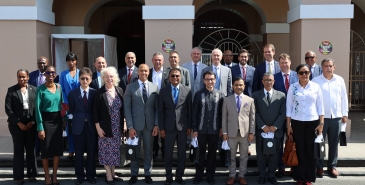May 07, 2013 - Interpersonal Violence
Speech delivered at: 56th Sitting - Tenth Parliament - 07 May, 2013
07 May, 2013
5963
May 07, 2013 - INTERPERSONAL VIOLENCE
Ms. Ferguson: I rise to give voice to the motion on interpersonal violence standing in my colleague’s name, the Hon. Deputy Speaker Mrs. Deborah Backer.
Former South African leader Mr. Nelson Mandela in his remarks honouring the report compiled by World Health Organization (WHO) on its initiative in promulgating interpersonal violence stated:
“We must address the root causes of violence only then we will transform the past century’s legacy from a crushing burden into a cautionary lesson”
Permit me to briefly give definition on the key term in the motion and the aspect of which my discussion will centre on, that is, public health in relation to interpersonal violence. The WHO has defined interpersonal violence as any behaviour within relationship that causes physical, physical or sexual harm to those in the relationship. Public Health by definition does not focus on individual patients, rather on the health of communities and populations holistically. With her contributions towards the report WHO Director General Gro Harlem Brundtland highlighted that public health has made some remarkable achievements, decades, particularly regarding the reduction rates amongst many childhood diseases. Her appeal to world leaders was that saving children from these diseases and causing then to fall victim or lose them later to acts of violence between intimate partners to the savoury of war and conflict of inflicted injuries or suicide would be a failure of public health. She further alluded, that while public health does not offer all of the answers to this complex problem, we are determined to play our role in the prevention of violence worldwide.
Reference to the sixth WHEREAS clause, in the motion, regarding to “research at the national, regional and international levels has shown that a high incidents of interpersonal violence has a significant negative effect on the economic growth and health of a country,” a November, 2011 article by Violence Prevention Alliance, Global Campaign for Violence Prevention, reported, under the head, “Violence prevention reduced deaths and diseases”.
From a public health and social development perspective our investing violence prevention will reduce, not only the burden of these associated with deaths and not so fatal injuries but, even more importantly, it will aid with the reduction of the substantial burden of violence related behaviour, mental health and physical health outcomes, all forms of violence, but particularly child maltreatment, intimate partner violence and sexual violence have been shown to have a range of health consequences such as depression, smoking, obesity, high risk sexual behaviours, unintended pregnancy, alcohol and drug misuse, an increase risk of involvement in violence as a victim of perpetuator hence, my support for the motion.
An examination of violent related burden of disease by Heise and Garcia Moreno, 2002, expressed that intimate partner violence results in an increase incidents of suicide and suicide effects as well as in depression, anxiety and phobias. They further posited that additional consequences include substance abuse, eating and sleeping disorders, poor self-esteem, post traumatic stress disorder, psychosomatic disorders and risky sexual behaviour. On the other hand Jewkes, Sen and Garcia-Moreno, 2002, explicitly mentioned that sexual assault results in consequences that can be long lasting and severe, including post traumatic stress disorder, depression and conduct disorders as well as sleeping and eating disorders. I recognise the motion as being very timely.
Retrospective to the three resolved clause on page seven of the Order Paper, which is before this National Assembly, my suggestion to the House is that we adopt some of the principles from the WHO report of 2002 and tailor them to suit our local environment since the crafters or engineers of the report intended for the document to be used globally. They are creating, implementing and monitoring a multi-sectorial national action of violence prevention, enhancing capacity for collecting data on violence, defining priorities for and supporting research on the causes, consequences, cost and prevention of violence, promoting primary prevention responses, strengthening responses for victims and integrating violence prevention, inter social and educational policies and thereby promoting gender and social equality.
Our nation has less than one million people and as a result of that I do visualise the following measures being complex for implementation and serve as prevention measures. In moving from problem to response the approach has four steps and these are:
• To statistically describe and monitor the extent of the problem, to identify the groups and communities at risk.
• To identify and understand the factors that place people at risk for violence, that is, to assess which factors may also be amendable to intervention.
• Top develop and evaluate interventions to reduce these risks.
• To implement and apply and imply widely the measures that are found to work by linking ongoing statistical description and monitoring of the problem to the fourth step of widespread implementation.
The four steps form a feedback group through which the effectiveness of violence prevention programmes can be constantly monitored and improved.
In conclusion, I have endorsed this motion tabled by the Hon. Deputy Speaker Mrs. Deborah Backer and hereby make a declaration to my fellow colleagues, on both sides of this National Assembly, to give their support, not only as political leaders, but as advocates to ensure that our people lives are safe against the social scourge commonly referred to as interpersonal violence.
Sir, I respectively, rest my case. Thank you. [Applause]
Speech delivered by:
What's New

16 April, 2025
Speaker of the National Assembly Hosts Luncheon and Tour of Public Buildings for Diplomats

08 April, 2025
Minister Kwame McCoy promotes Low Carbon Development Strategy in IPU Committee Meeting on Sustainable Development

07 April, 2025
Speaker Nadir Emphasises Guyana’s Commitment to Social Development at IPU General Debate

07 April, 2025
Guyana Delegation Attends 150th Inter-Parliamentary Union Assembly in Tashkent, Uzbekistan

